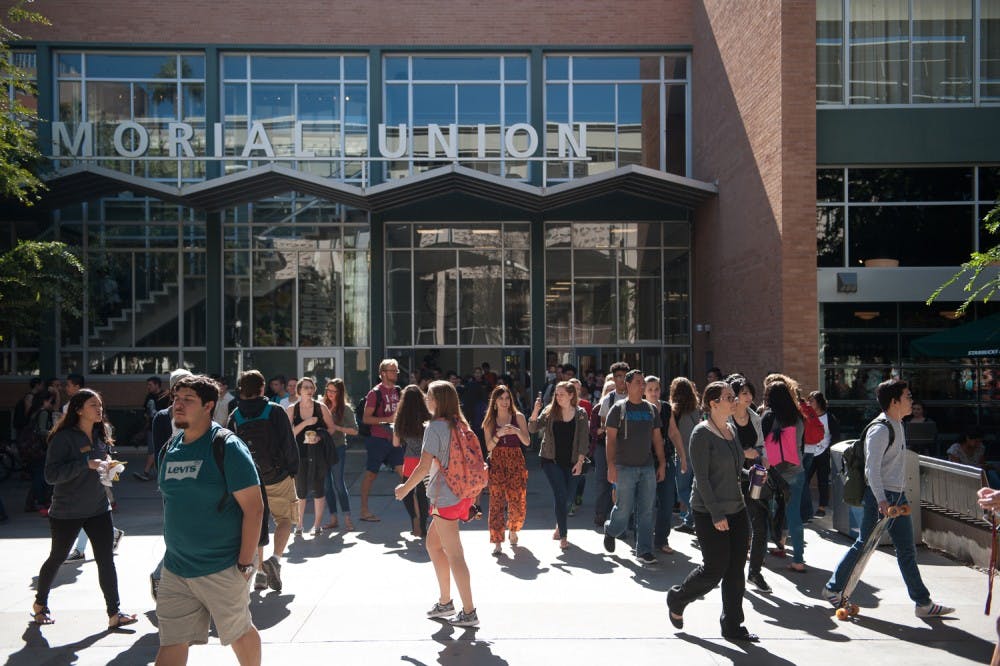The Arizona State Legislature drew statewide backlash last week when Republican State Representative Bob Thorpe filed two bills — one already dead — aimed at changing the voting rights and cutting social justice classes for college students in Arizona.
House Bill 2260 would in effect disallow any student living in a “dormitory address or other temporary college or university address,” to use that address to register to vote.
'This is disenfranchisement on its face'
Maricopa County Recorder Adrian Fontes, who oversees voter registration in Maricopa County, said that the bill is both unconstitutional and unenforceable.
“It violates the First Amendment, it violates the due process clause, and it violates the equal protections clause,” Fontes said. “I would think a constitutional conservative like Thorpe would have looked at these things.”
Fontes, who made student polling locations and voting rights priorities in his campaign, said that he would stay committed to those goals and staunchly opposed the bill.
“This is disenfranchisement on its face,” he said. “It treats one particular class of eligible voter different then another eligible class of voters.”
Student political leaders and activists on both sides of the aisle decried the bill as a blatant attack on the rights of students.
The president of ASU Young Democrats, Zakary Ghali echoed the recorder’s sentiment.
“Students are the people who spend nine or more months out of the year in this district living at that address,” Ghali said. “I don’t understand why a legislator would go out of their way to make sure someone isn’t able to vote."
Likewise, the President of the ASU College Republicans Kevin Calabrese said that the bill goes too far.
“College students should be allowed to register to vote from their dorm addresses as long as all the existing requirements are satisfied,” Calabrese said. “There are a lot of students who live in the dorms for a year or two … and eventually decide to reside in Tempe after they graduate.”
In regards to the bipartisan opposition to the bill, Calabrese said that regardless of party, no college student would support the bill.
“I don’t see who would be in support of it as far as college students go,” Calabrese said.
HB 2260 is currently awaiting assignment to a committee.
Social justice classes
The other bill would have penalized Arizona universities and community colleges for teaching classes that promote “division, resentment or social justice toward a race, gender, religion, political affiliation, social class or other class.”
The bill was effectively killed in committee last week when Rep. Paul Boyer (R-Phoenix), chairman of the House Education Committee, refused to hear the bill.
House Bill 2120 would have penalized state universities and community colleges 10 percent of their state funding for teaching any class that advocated “solidarity or isolation based on ethnicity, race, religion, gender or social class instead of the treatment of students as individuals,” or any class that “negatively target specific nationalities or countries.”
Rep. Bob Thorpe (R-Flagstaff) introduced the bill because of an ASU class originally titled “The Problem of Whiteness,” according Arizona NBC affiliate KPNX. The bill led to a social media outcry, much of the attention being negative.
Rep. Tony Navarrete (D-Phoenix) said he heard concern from his district and that it was his responsibility to represent their diversity in the legislature.
“I represent West Phoenix and Glendale; this is the most diverse district in the state of Arizona … so there was a huge outpouring of concern over this legislation,” Navarrete said. “I stood by with the community on this issue because it’s the right thing to do and we have to make sure that bills like this don’t go anywhere.”
House Minority Leader Rep. Rebecca Rios (D-Phoenix) used the opportunity to draw comparisons to the incoming presidential administration.
“He’s very conservative and I pretty much anticipated that with a Trump Presidency some of these more radical right-wing legislators would feel very emboldened,” Rios said.
She thanked Boyer and Rep. JD Mesnard (R-Gilbert) for killing the bill.
“I think a lot of credit goes to the speaker of the house as well as the chairman of the education committee for their willingness to recognize that this was not a good piece of legislation, that it was going to be a huge distraction from the bigger issues that we have to deal with in Arizona,” she said. “I think it led to them putting a halt to his bill gaining any traction or getting a hearing.”
Thorpe’s office declined multiple requests for comment and disconnected his office phone line over the course of this report. A staff member said that he was declining all media requests at the time.
Reach the reporters at isaac.windes@asu.edu and maatenci@asu.edu or follow @isaacwindeschef and @mitchellatencio on Twitter.
Like The State Press on Facebook and follow @statepress on Twitter.




